
Marvel Studios / The Walt Disney Company
Starring Tom Hiddleston (Loki Variant L1130 / President Loki), Sophie Di Martino (Sylvie), Owen Wilson (Mobius), Gugu Mbatha-Raw (Ravonna Renslayer), Wunmi Mosaku (Hunter B-15), Tara Strong (the voice of Miss Minutes), Sasha Lane (Hunter C-20), Jack Veal (Kid Loki), DeObia Oparei (Boastful Loki), and Richard E. Grant (Classic Loki), with Jonathan Majors as He Who Remains / the Voice of the Timekeepers and Chris Hemsworth as the voice of Throg / Thor Variant T365
LOKI
Directed by Kate Herron
Produced by Kevin Feige, Victoria Alonso, Louis D’Esposito, Michael Waldron, Stephen Broussard, Kate Herron, and Tom Hiddleston
Music By Natalie Holt
Distributed by Disney Platform Distribution
Number of Episodes: 6
Initial Streaming: June 9, 2021 – July 14, 2021

Marvel Studios / The Walt Disney Company
Fun Loki Facts
In August-2017, Marvel Studios President Kevin Feige organized his latest Marvel Studios Creative Retreat in an effort to begin developing plans for Phase Four of the Marvel Cinematic Universe. The goal was to develop a blueprint for the next five-years of Marvel Studios projects post-The Infinity Saga. No public announcements were made, but Feige and his team first discussed their visions for future Marvel Studios projects such as Eternals, Black Widow, and Shang-Chi and the Legend of the Ten Rings on this retreat. Some four-months later in December-2017, Bob Iger dropped the news on Feige that The Walt Disney Company was entering the Streaming Platform business, with a target launch date of 2019. Iger proposed the idea of a series of streaming television shows that would be set within the Marvel Cinematic Universe, and that more importantly, would be produced by Kevin Feige and his Marvel Studios team. Excited by the prospect, Feige encouraged his creative team to begin brainstorming ideas for potential shows, and the foundations for the shows that would eventually become Loki, WandaVision, The Falcon and The Winter Soldier and What If …? were laid.
On December 14, 2017, The Walt Disney Company announced that a deal had been reached with 21st Century Fox that would see Disney acquire Fox’s television and film divisions, among other things. For comic book fans, this deal was huge, for it meant that Marvel characters such as The X-Men, The Fantastic Four, and Deadpool would be free to be ushered into the Marvel Cinematic Universe. This development would end up impacting the Loki series in a very big way, as it freed-up Kang the Conqueror for use by Marvel Studios within the MCU.
On November 8, 2018, Bob Iger confirmed the name of the upstart Disney Streaming Service as Disney+. The Loki series was also confirmed for Disney+ with Tom Hiddleston reprising his role as the God of Mischief.
On July 20, 2019, Marvel Studios presented its landmark 10th presentation at San Diego Comic Con where Marvel Studios President Kevin Feige hyped Loki for Disney+, announcing a release window of Spring-2021. Tom Hiddleston appeared onstage with Feige to tout the series, which Feige confirmed would follow the journey of the version of Loki that escaped Avengers custody with the Tesseract during the Time Heist, as seen in Avengers: Endgame.
On August 25, 2019, Kate Herron was announced as the showrunner for Marvel Studios’ Loki series.
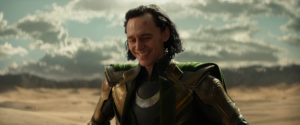
Marvel Studios / The Walt Disney Company
On October 15, 2019, The Walt Disney Company announced the promotion of Marvel Studios President Kevin Feige to Chief Creative Officer of all things Marvel Entertainment. This meant that Feige would now oversee movies, television, and even publishing. Marvel Television (led by Jeph Loeb) was disbanded and even Marvel Entertainment President Dan Buckley and Marvel Chairman Ike Perlmutter would now essentially answer to Feige. Disney stated that all of this was being done in an effort to create a more cohesive Marvel Cinematic Universe.
On November 12, 2019, Walt Disney Pictures launched its Disney+ Streaming Service in the United States. A special feature titled Marvel Studios: Expanding the Universe was included for viewing upon the launch. The special featured footage from the 2019 San Diego Comic Con and D23 conventions along with some new concept art from Loki. The new streaming service drew a reported 10-million subscribers on its first day.
On February 2, 2020, during the NFL’s Super Bowl LIV, Marvel Studios released a 30-second teaser that previewed the upcoming Disney+ television series, including Loki.
On February 10, 2020, Loki commenced filming.
On March 15, 2020, Marvel Studios announced that all filming on Loki had been halted for two weeks due to concerns related to the sudden Coronavirus outbreak.

Marvel Studios / The Walt Disney Company
On March 22, 2020, Marvel Studios completely shut down due to continued concerns over the ongoing COVID-19 Coronavirus outbreak. All ongoing shoots had already been postponed, but a further step was taken to close the Marvel Studios offices in Burbank, California as the Coronavirus continued to wreak havoc on American life, complete with a mandatory stay-at-home order to all residents in California for the foreseeable future.
On December 5, 2020, after weeks upon weeks of delays, Loki wrapped filming.
In Loki, we are introduced to the Time Variance Authority. The TVA was created by Walter Simonson and Sal Buscema, debuting in Thor # 372 in 1986. In the comics, the TVA played homage to longtime Marvel writer Mark Gruenwald, who is credited with coming up with the classification system for the Alternate Realities that comprise the Marvel Multiverse. In the comics, the entire TVA staff was comprised of clones that were drawn in the likeness of Gruenwald, most notably Mobius M. Mobius, who led the organization. In the Marvel comics, He Who Remains was actually the last surviving member of the TVA, present at the End of Time. The purpose of the TVA that was introduced in Loki: Season One is to police the “Sacred Timeline”; the preordained “proper” Flow of Time as decided from the End of Time. Their most important duty in Loki: Season One is the “pruning” of Multiversal “Variants” which are the physical result of “Nexus Events”; the blatant or accidental defiance of one’s destiny. Nexus Events spur Branched Timelines from off the Sacred Timeline that must be eradicated by the TVA before they cross the dreaded “Red Line” at which point they would grow into an entirely New Reality that if left unchecked could result in a violent and cataclysmic Multiversal War.
In Loki, we are introduced to several Loki Variants, including a female Variant named Sylvie. In the Marvel comics, Loki first took on a female form in 2007’s Thor # 5 written by J Michael Straczynski and illustrated by Oliver Coipel. In this series, Loki adorned the skin of the Lady Sif upon the resurrection of the Norse gods following Ragnarok. In his female guise, Loki was a member of the sinister Cabal, comprised of Norman Osborn, Emma Frost, Namor the Submariner, Doctor Doom, and The Hood. I highly recommend Straczynski’s Thor run. Sophie Di Martino’s Sylvie, while being a Variant of Loki, is also based off Sylvie the Enchantress, a character that debuted in 2009’s Dark Avengers by Paul Cornell and Mark Brooks; a follow-up to the original Enchantress (Amora), created by Stan Lee and Jack Kirby in 1964.
In Loki, we are also introduced to a child Variant of Loki referred to as Kid Loki. In the Marvel comics, Kid Loki debuted in Matt Fraction’s Thor #617 in 2010, but truly came into his own as a character through the work of Kieron Gillen in the Journey into Mystery series. In the comics, Kid Loki longed to be a hero while struggling with his destiny; a narrative that Marvel Studios’ Loki series adopted as a main plot point, despite it not actually pertaining to the Kid Loki version of the God of Mischief specifically. Gillen’s Journey into Mystery is a series that I cannot recommend highly enough.
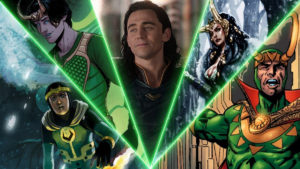
Marvel Studios / The Walt Disney Company / Marvel Entertainment
In Loki, we are also introduced to a Loki Variant known as President Loki. This character was inspired by Christopher Hastings’ 2016 Vote Loki series and in terms of appearance, was very faithfully adapted. This series is a fun and entertaining read, as Loki puts together a successful political campaign that thrives based on his brutal honesty about being a liar.
In Loki, we are also introduced to a Loki Variant known as Classic Loki. This character did not actually come from a specific comic book arc but was rather based on the idea of the classic Marvel Comics Loki that first appeared in 1962, created by Stan Lee, Jack Kirby, and Larry Lieber. Classic Loki wears Loki’s original comic book outfit, which is a lot of fun to see in live action in the same way that it was fun to see Wanda Maximoff and VISION dressed in theirs on Halloween in WandaVision.
Loki’s aren’t the only Variants we see in Loki, as we are also introduced to a Variant of Thor who has been transformed into a frog. In the Marvel comics, Loki turned Thor into a frog in 1986’s Thor # 364 by Walter Simonson.
On December 10, 2020, The Walt Disney Company hosted a conference call that was dubbed “Investor’s Day” in an effort to generate revenue in what had been the most challenging year in company history with the COVID-19 Coronavirus Pandemic shutting down film and television productions, closing theaters, canceling cons and conventions, and closing theme parks, while infecting 69-million people worldwide and killing 1.5 million. With no San Diego Comic Con and no D23, there had been no formal announcements from Marvel Studios over the course of 2020, forcing fans to carefully follow just about every leak and rumor that emerged while clinging to hope that at least some of them were true. Finally, at Investor’s Day, many of the rumors that had been floating around out there proved true, while some were completely ignored, which didn’t necessarily make them not true by any means but put a lot of them on the backburner in light of all of the announcements that came. Marvel Studios produced a near 23-minute clip featuring Marvel Chief Creative Officer Kevin Feige and there was plenty for fans to sink their teeth into, including Feige’s announcement that Loki would debut on Disney+ in May of 2021, along with a trailer for the series and official casting announcements for Owen Wilson, Gugu Mbatha-Raw, Sophia Di Martino, Wunmi Mosaku, and Richard E. Grant.
On April 5, 2021, Marvel Studios dropped a full trailer for the upcoming Loki series on Disney+. The trailer’s primary focus was to explain to audiences that this unique series would revolve around the (Variant) version of Loki that escaped from Avengers custody with the Tesseract in Avengers: Endgame and to establish the presence of The Time Variance Authority as a major force within the Marvel Cinematic Universe. Loki‘s release date was confirmed as June 11, 2021.
On May 5, 2021, Marvel Studios announced that the upcoming Loki series on Disney+ would premier two days earlier than expected: on Wednesday, June 9, 2021.
On September 26, 2023, Loki: Season One was released on Blu-ray in the United States, making it the first Marvel Studios Disney+ production to ever be released on Physical Media.
According to the 2023 book Marvel Studios – The Marvel Cinematic Universe: An Official Timeline, the Headquarters of the Time Variance Authority is located on its own Timeline, separate from the Sacred Timeline. However, in terms of chronological MCU viewing, the book suggests that Loki: Season One should be viewed directly after Avengers: Endgame, which features introduces us to the Loki Variant that this series revolves around. Loki: Season Two, which was released in 2023, picks up right where Loki: Season One leaves off, and both Seasons of Loki take place chronologically before Disney+ series such as What If …? and WandaVision.

Marvel Studios / The Walt Disney Company
UNDERSTANDING TIME TRAVEL IN THE MCU
Avengers: Endgame introduced the concept of time travel into the Marvel Cinematic Universe. Time travel was a significant plot device that had widespread ramifications on not just Avengers: Endgame, but on the entire MCU. The filmmakers took an approach to Time Travel that has been theorized within Quantum Mechanics in the “Many Worlds Theory.” This is not a familiar approach for general moviegoers, as time travel has been traditionally approached from a very different perspective in most films that utilize the plot device. In Endgame, popular theories such as “The Grandfather Paradox” do not apply, because you can’t go to back to the past and change your future, because your future has already happened. This is why The Avengers can’t simply travel back through time and kill baby Thanos before he ever grows up as Rhodey suggests in the film. Time travel (at least in Avengers: Endgame) does not work that way. By doing that, The Avengers would create a Branch from off the (Sacred) Timeline and would merely kill that timeline’s Thanos and spare that timeline Thanos’ wrath.
This is where the “Many Worlds” angle comes in, and what this theory suggests is that the Universe exists in a state of constant expansion in which it is continually splitting (or branching off) into extensions that exist initially as duplicate Parallel Universes that evolve into a range of either very similar or very different New Realities. These Universes comprise what some have labeled the “Multiverse.” This theory is directly referenced in Loki: Season One when the Sylvie character exclaims The Universe wants to break free, so it manifest chaos.” Exactly who and what the Universe wants to “break free” from fueled the plot of the First Season of Loki and carried over into its Second Season as well.
The concept of the Multiverse is not new to comic book readers, and it has been a Marvel Comics plot device since the 1970’s. An attempt is made to explain how this ties into time travel through the dialogue of several characters in Avengers: Endgame. As it is told in that film, the mere act of traveling back through time can create one of these Branched / New Realities. Upon the arrival of a time traveler or time travelers, the Universe executes a sort of copy / paste initiative in which a New (Branched) Reality is spawned / created. The time traveler / time travelers now exist in this new Parallel World; one that shares the exact history of the world from whence they came … up until the moment that they arrived in the past. This is why people and places look and act identical to the same people and places from whence the time travelers came … Because they are. They are for lack of a better word, Cosmic Copies of the people and places they knew.
From that point of arrival however, things are free to move forward in whatever way they may, and one simple change or alteration to the history that the time travelers know can result in unfathomable changes to the New Reality that they’ve spawned and when this occurs the TVA registers it as a Nexus Event and the person who caused it is accused of a “Crime Against the Sacred Timeline” and they are arrested while the Branched Timeline that they’ve created is reset / pruned. In terms of the chronological release dates of MCU productions, Avengers: Endgame was the first Nexus Event that was seen on-screen, and this happened when 2012-Loki escaped with the Tesseract. In this New Reality, Loki’s destiny would be dramatically different from its intended course, as in this new, Branched Reality, Thor would not take Loki and the Tesseract back to Asgard following the Battle of New York, Loki wouldn’t inadvertently cause the death of Frigga after being taken back to Asgard, and Loki would not be murdered by Thanos. Loki: Season One shows us the fate of the 2012 Branched Timeline that Loki created and explains that Loki’s escape was not “supposed to happen.” After Loki escaped with the Tesseract, he was quickly confronted by the TVA and arrested, and the potential 2012 Branched Timeline was then reset / pruned and ceased to exist.

Marvel Studios / The Walt Disney Company
The Dogma of the TVA:
“Long ago, there was a vast Multiversal War. Countless unique timelines battled each other for supremacy, nearly resulting in the total destruction of … well, everything. But then, the all-knowing Timekeepers emerged, bringing peace by reorganizing the Multiverse into a single timeline: the Sacred Timeline.” – Miss Minutes.
Loki introduced viewers to the Time Variance Authority; an organization that policed the Sacred Timeline by ensuring that no Branched Timelines that grow out from off the Sacred Timeline as a result of one violating his or her intended destiny, are allowed to grow into a fully functioning Branched Reality if the violation registers as a “Nexus Event”; a crime against the Sacred Timeline. Such a Reality would not only mean free will but would mean unabashed chaos that could lead to another Multiversal War, and the TVA could not allow such a Reality to exist. The TVA served a mysterious trio of what were more or less Space Lizards called The Timekeepers. TVA Agents were taught that the Timekeepers created the TVA and its workers in order to prevent a new Multiversal War and TVA Agents were armed with numerous devices that assisted them in their efforts, including TemPads, Time Twisters, Time Wands, Time Cells, and Reset Charges. They were also assisted by a unique Artificially Intelligent program / hologram known as Miss Minutes. From TVA Headquarters, the TVA Agents monitored the Sacred Timeline, searching for any signs of Nexus Events and potential Branched Realities. The Sacred Timeline was also monitored by the Timekeepers, who the entire TVA answered to. Only TVA Judges were permitted audience with the Timekeepers and the TVA Judge oversaw all cases of Variants; people who were apprehended by the TVA for violating the Sacred Timeline. When a Variant was found guilty, they were mercilessly “pruned” and the Reality / Timeline from whence they came was reset (a nice way of saying purged).
This was the way of things … or so it was said.
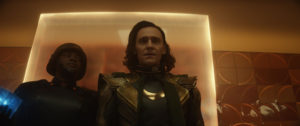
Marvel Studios / The Walt Disney Company
My Loki Review
Glorious Purpose – Directed by Kate Herron. Written by Michael Waldron.
On Wednesday, June 9, 2021, the first episode of Loki starring Tom Hiddleston and Owen Wilson premiered on Disney+. The series was Marvel Studios’ third venture into the realm of television streaming. The episode kicked-off with the scene in Avengers: Endgame where Loki stole the Tesseract and escaped with it during The Avengers’ Time Heist and saw him land in foreign territory where he was arrested by the Time Variance Authority. The TVA reset the Timeline and declared Loki a Variant, taking the God of Mischief to their Headquarters to stand before Judge Ravonna Renslayer.
There, Loki found himself confused, disrespected, and completely out of his league and he found himself greatly outmatched by the TVA, as Loki as well as the Tesseract had been rendered powerless, for Loki was surrounded by technology far beyond his understanding.
Standing before Judge Renslayer, Loki blamed his predicament on The Avengers, noting that it was their time-traveling antics that allowed him to escape with the Tesseract, but Renslayer informed him that the TVA approved of The Avengers’ time-traveling, because it was supposed to happen, while Loki escaping with the Tesseract was not. Loki was then told that he had violated the “Sacred Timeline” that the TVA existed to maintain. Loki was then approached by TVA Agent Mobius (wonderfully portrayed by Owen Wilson), who took Loki away amidst hopes of recruiting the God of Mischief to assist Mobius and the TVA on a case that had become of great concern to everyone involved.
From there, Mobius took Loki on a brief tour of the TVA before taking him to the TVA Theater where he showed archived Loki video footage of his previous antics leading up to the Battle of New York while demanding to know why it was that Loki was the way that he was. Loki mocked Mobius throughout this process, prompting Mobius to show Loki shocking footage of the death of his beloved adopted mother Frigga during the Dark Elf invasion of Asgard in the year 2013 (as seen in Thor: Ragnarok); an event that for this Loki Variant, has yet to occur.
Loki was startled to see that it was his actions that directly led to the death of Frigga in his intended Timeline but went on to laugh all of it off as some sort of devious trick. Mobius pressed on, explaining to Loki that he had a predestined path that he was supposed to stay on; a path that was part of the Sacred Timeline, and that taking the Tesseract and fleeing the Battle of New York was not part of that path. Loki continued to scoff at Mobius until the militant Hunter B-15, who originally apprehended Loki, barged into the room, demanding assistance. Mobius complied and ordered Loki to stay put, but the ever-defiant God of Mischief made an effort to escape after commandeering Mobius’ Time-Twister device. Loki used this device to bounce around the TVA, ultimately happening upon a room of desk workers. Loki attempted to take a hostage, but the TVA employee he tried to threaten was oblivious to his threats. Then, Loki discovered within the desk of this TVA worker, a drawer full of Infinity Stones from a variety of potential Branched Timelines that the TVA had reset. These Stones were as powerless as the Tesseract that he brought with him, and this realization absolutely demoralized Loki as he realized that he really was in way over his head.

Marvel Studios / The Walt Disney Company
A dejected Loki returned to the Time Theater and allowing his curiosity to get the best of him, activated the machine that Mobius had used previously to look into his predestined future. Here, Loki was overcome with a variety of raw emotions from joy to grief, to sheer horror. The God of Mischief watched not only the death of Frigga, but also the death of Odin on Midgard and his uniting with Thor for the war against Hela (as seen in Thor: Ragnarok), and then, his heroic death at the hands of Thanos (as seen in Avengers: Endgame). Having seen his predestined future, Loki found himself at a loss for words when he was reunited with Mobius, realizing that he could never go back to his Timeline.
Faced with the choice of assisting Mobius or being pruned, Loki begrudgingly agreed to help in any way that he could. Mobius then explained that the case he needed Loki’s help on involved an entity that had declared war on the TVA, murdering countless Minutemen at various points in time, while threatening to abolish the Sacred Timeline.
From there, Mobius explained to Loki that he needed his help specifically, because the murderous entity he was trying to stop was .. Loki; another Variant from another Branched Timeline that had since been pruned!
So, Loki is my favorite Marvel character, so of course, I loved the first episode of this series. I found it stronger than either of the first episodes of WandaVision or The Falcon and The Winter Soldier, and even after the viewing of episode one, I could see this show easily ending up as my favorite Marvel TV series of all time, and probably in the upper echelon of all Marvel Studios productions.
The TVA and the whole Branched Timeline things were very exciting concepts, as were the Timekeepers, the Multiversal War, and the concept of Variants. Avengers: Endgame left MCU fans with lots of questions pertaining to time travel; questions that had lingered for more than two years by the time Loki was released, and it seemed like this Loki series was going to answer those questions as it progressed, while in all likelihood, invoking a ton of new ones.

Marvel Studios / The Walt Disney Company
I was overwhelmed by how so very good the first episode of Loki was! Tom Hiddleston could have easily phoned it in for a paycheck here after around a decade of portraying the God of Mischief, but instead, he portrayed Loki with more fire, and more drive, and more emotion than ever! By the rules of the show alone, this is a different Loki, but Tom Hiddleston gave us a different Loki through his performance, presenting a more vulnerable God of Mischief that doesn’t quite know what to do with these new truths he is presented with. Remember for this Loki, he has just been shown that pretty much everything that Odin taught him had been a lie. Not only was he the adopted biological son of King Laufey and not Asgardian, but he also spent hundreds of years oblivious to the fact that a whole Universe existed beyond the Nine Realms, and oblivious to the true power of the Infinity Stones. Loki was raised in a world of lies, and the only truth he knew at this point was that he was born to be a King and that he had been denied his birthright by his adopted father, who was more akin to a kidnapper! Loki declared war on Earth on behalf of Thanos in an effort to claim a throne and stick it to Odin and Thor, and this was the pinnacle of his ambition at the point in time he was thrust into the TVA and exposed to even more truths that he had no prior knowledge of! Loki had just found out about the true power of the Tesseract, and now, he was discovering that that power paled in comparison to the power of the TVA! To say that Loki was vulnerable at this point would be a gross understatement! Loki didn’t know up from down at this stage. Everything that he ever thought to be true was a lie, and this was a terrible burden unlike anything Loki had ever carried before, which made him more desperate than he’d ever been, which by definition made him more dangerous than he’d ever been!
Coming into this series, I was not an Owen Wilson fan. To each their own of course, but Owen Wilson just never clicked with me. In fact, I found myself as a fan, quite annoyed when his casting was announced, because I assumed it was going to add a goofy element to this series. That being said and admitted, I have never been more wrong! Owen Wilson was amazing in Loki, and I was all-in on his portrayal of Mobius in the first episode alone! Wilson portrayed Mobius with a sincere conviction and that made it impossible to not like him! He was funny and entertaining in a straight-man sort of way, and I found myself buying everything that he was selling about the TVA even though I knew better! The chemistry between Owen Wilson and Tom Hiddleston was special, and I found myself longing for an entire series of just them talking to each other. Today, I’m an Owen Wilson fan, and I hope to see much, much more of him in the Marvel Cinematic Universe.
Now, let’s talk about propaganda. We all know it’s real and that it’s wielded as a weapon towards the goal of controlling select people, but the TVA took propaganda to an entirely new level! A Sacred Timeline overseen by Space Lizards and policed by the TVA!?! Come on!!! However, the Miss Minutes character sells it all like a champ, and I am a HUGE fan of Miss Minutes!!! As of the first episode, we don’t know much about her, aside from the obvious fact that she is a tool that is used towards professing the nobility of the TVA, but Tara Strong was incredibly convincing in her voice acting! From that first presentation, Miss Minutes felt manipulative and dare I say evil, but she was also likable and irresistible with her Southern accent and old-cartoon illustrations. This was perfect for a series that revolves around a character in Loki that is by definition “evil”, yet irresistibly likable, as it set-up a tremendously intriguing dynamic that I could not wait to see play itself out!
I cannot fairly say that the premier episode of Loki was everything that I wanted it to be, because it far exceeded my hopes and expectations! Marvel Studios introduced some fantastic characters and concepts, and I was both satisfied and immensely intrigued coming out of the first episode.
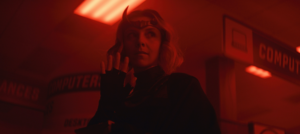
Marvel Studios / The Walt Disney Company
The Variant – Directed by Kate Herron. Written by Elissa Karasik.
On Wednesday, June 16, 2021, the second episode of Loki starring Tom Hiddleston and Owen Wilson and introducing Sophia Di Martino premiered on Disney+. The episode saw Loki begin working with Mobius and the Time Variance Authority in their mission to hunt down the rogue Variant that was causing them so much trouble. As we saw at the beginning of this episode, the other Loki Variant had taken things to a dangerous new level, actually taking a hostage (TVA Hunter C-20) in an effort to learn the location of the Timekeepers.
Arriving in Oshkosh, Wisconsin, in the year 1985, Loki’s apparent willingness to work with the TVA was revealed to be a ruse, as the God of Mischief was far too irritated by his predicament and far too intrigued by the notion of meeting an alternate version of himself to serve the Time Variance Authority. In Wisconsin, Loki actually stalled for time in order to allow the Variant time to escape, infuriating Mobius as well as Judge Renslayer, who’d begrudgingly approved Loki’s involvement in the case.
Mobius was desperate though, not just to apprehend the Variant, but to rescue Hunter C-20, and that desperation provoked Mobius to give Loki another chance, encouraging the God of Mischief to thoroughly study all of the files that the TVA had pertaining to the Variant. This led to a really touching moment when Loki read about Ragnarok and the destruction of Asgard (which took more than 9,000 Asgardian lives). It was in his study of this event that Loki discovered a method to the Variant’s madness and deduced where the Variant just may be hiding out. Loki rushed over to Mobius and voiced his theory.
As Loki saw it, the TVA had been unable to successfully track the Variant due to the fact that the Variant was hiding out within various apocalypses along the Sacred Timeline. Loki reasoned that any action taken just prior to an apocalyptic event would not create a Branched Reality, because anything done to defy one’s destiny would not matter because they, as well as everyone around them, were essentially doomed.
To test Loki’s theory, an intrigued Mobius took Loki to Pompeii in the year 79 AD, moments before the ctaclysmic eruption of Mount Vesuvius. Certain that he was right, Loki began screaming to everyone around him that he was from the future and that they were all going to die. This greatly concerned Mobius initially, but he then noticed much to his dismay, that there was no Branch extending from the Sacred Timeline. Nothing that either of them did in that moment mattered and as the volcano erupted, Loki and Mobius exited Pompeii and returned to TVA Headquarters.

Marvel Studios / The Walt Disney Company
There, Loki and Mobius began studying various apocalyptic events and during a conversation with Loki, Mobius eventually happened upon the event that he believed the Variant to be: an apocalyptic hurricane that demolishes Alabama in the year 2050. Mobius rounded up a team to investigate Loki’s theory. There, Loki, as he’d hoped, encountered the Variant. The Variant initially refused to reveal their face, choosing to instead enchant various people and talk – and fight – through them. Loki’s frustration grew as the Variant refused his proposal to team-up against the TVA, for the two Loki’s had conflicting agendas. Our Loki sought to overthrow the Timekeepers and rule the TVA, but the Variant wanted no part of any such throne. Their goal was to kill the Timekeepers and destroy the TVA. They had in fact been collecting TVA Reset Charges and had rigged them to blow, in an effort to essentially bomb the Sacred Timeline to such a point that the entire TVA would be occupied enough to provide an opportunity for the Variant to venture to TVA Headquarters and slay the Timekeepers.
The Variant soon revealed their face to Loki, revealing that this Loki Variant was a female! From there, Loki could merely watch as the Variant set off the Reset Charges she’d collected. The Variant opened a Time Door and escaped through it as Mobius and his TVA team came charging towards her. Mobius called-out to Loki, but Loki followed the Variant through the Time Door.
Back at TVA Headquarters, the Time Variance Authority were rendered panicked as Branches began extending from off the Sacred Timeline at an alarming rate, quickly approaching the Red Line! The TVA Hunters therefore sprang into action as the episode came to an end.
I loved The Variant just as much as I loved Glorious Purpose. Both of these episodes were so very good, and there was a lot to like in this episode! We got a lot more of Tom Hiddleston and Owen Wilson together, which was a big win. They continued to boast amazing chemistry and there were plenty of more humorous and some genuinely touching moments between the two, such as Mobius discussing his love for jet skis, and their friendly debate over free will, predestination, and the power of belief. This was some of the most well-written stuff to ever come out of Marvel Studios.
On top of all of that, the Pompeii scene was amazing! It was clear that Tom Hiddleston was having fun, and that made me as a viewer have fun with the whole thing, despite how over-the-top and considerably unsympathetic Loki was during the scene. It’s things like this sequence right here that make Loki such a great character though. Emotionally speaking, he is all over the place, and there are a lot of people that can relate to that. Even at his lowest, he can find something to laugh about and something to be entertained by.
Wrapping up this episode, the bombing of the Sacred Timeline by the Variant was shocking at the time, and I came out of this episode expecting the birth of a new Multiverse, though that was not to be.
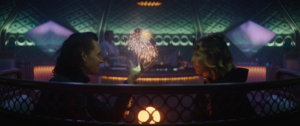
Marvel Studios / The Walt Disney Company
Lamentis – Directed by Kate Herron. Written by Bisha K. Ali.
On Wednesday, June 23, 2021, the third episode of Loki starring Tom Hiddleston and Sophia Di Martino premiered on Disney+. The episode opened with the female Loki Variant arriving at the TVA Headquarters and targeting the Timekeepers. She was followed by our Loki of course, and back at the TVA, Loki confiscated his daggers and armed himself for battle. The female Variant quickly discovered that she (like Tom Hiddleston’s Loki before her) was powerless within the TVA Headquarters, and with TVA forces closing in, she took Tom Hiddleston’s Loki hostage and threatened his life as Judge Renslayer approached, but Renslayer dared her to go ahead and kill Loki. Before things could escalate further, Loki activated the Variant’s TemPad and the two Loki’s were teleported to the year 2077, on a moon known as Lamentis-1, that was hours away from apocalyptic destruction. The TemPad ran out of power upon their arrival however, forcing the two Loki’s to work together toward the goal of recharging the TemPad before the moon’s pending obliteration, which would arrive in a matter of hours. In the meantime, Loki learned that the female Variant went by the name Sylvie, having abandoned the name “Loki” years earlier.
Loki and Sylvie made their way to a train that was destined for an escape craft labeled the Ark. Sylvie reasoned that the TemPad could be charged aboard the train. As Loki and Sylvie settled down, they shared select details of their lives with one another, discovering in the process that they were very much the same while also being quite different. Sylvie for instance boasted the power of enchantment but did not share Loki’s talents for magic. She also knew that she was adopted from a young age, but Loki had fonder memories of his mother, as Sylvie insisted that she barely remembered hers anymore.
As the train ride progressed, Sylvie slipped off to sleep and Loki had too much to drink, provoking him to lead the bar area in a song and dance number that was both funny and moving. It was clear to me at this point that Loki was completely enamored with Sylvie!
Loki’s antics provoked his and Sylvie’s removal from the train and the TemPad was destroyed during Loki’s crash. This landed Loki and Sylvie in an even more desperate place, as they seemed doomed to die on Lamentis-1. With seemingly nothing to lose, Loki and Sylvie opened up to one another even further, and Sylvie revealed the startling fact that the TVA was entirely comprised of Variants! Sylvie noted the hypocrisy in this, but Loki assured her that the TVA Agents did not know this.

Marvel Studios / The Walt Disney Company
As the episode ended, Loki and Sylvie worked together in an effort to fight their way aboard the Ark and live to see another day, only to watch the Ark go up in flames. Time and hope had seemingly run out, and Loki and Sylvie were doomed.
Lamentis was a visually beautiful episode of Loki, with a sort of Guardians of the Galaxy feel in terms of color schemes and the interstellar setting, and the chemistry between Tom Hiddleston and Sophia Di Martino made all of their scenes together very enjoyable. While I did miss Owen Wilson’s Mobius this week, there was a lot of cool and revealing stuff to unpack that had me just going crazy in anticipation of what came next.
As was the case in the previous two episodes, Tom Hiddleston really shined, with his song once again driving home the fact that Loki is all over the place. A true and genuine sadness emanated from Hiddleston mere seconds apart from pure joy! Yes, he was having fun, but he was staying true to his character in the process, and I really don’t have enough words to justifiably praise his performance in these first three episodes.
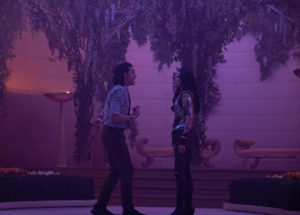
Marvel Studios / The Walt Disney Company
The Nexus Event – Directed by Kate Herron, Written by Eric Martin.
On Wednesday, June 30, 2021, the fourth episode of Loki aired on Disney+ starring Tom Hiddleston, Sophia Di Martino, and Owen Wilson. The episode picked up where the previous week’s episode left off as Loki and Sylvie were trapped on Lamentis-1 awaiting their impending doom. Believing her life had reached its end, Sylvie shared more details of her past with Loki, telling him that she had been on the run from the TVA since she was a child. Sylvie’s honesty was the final straw that endeared her to Loki in ways that he had never been endeared to another being and he began to helplessly fall in love with the Variant. The feeling was mutual, and these feelings triggered a powerful Branched Timeline despite their pending doom, alerting the TVA to their whereabouts.
The TVA responded in force, arriving at Lamentis-1 and taking Loki and Sylvie into custody, imprisoning them both at the TVA Headquarters. This led to a Loki and Mobius reunion, and Loki attempted to explain to Mobius the many lies that the TVA had indoctrinated him with, but Mobius would hear none of it, and entrapped Loki within a Time Loop that forced him to relive a scene from his past over and over and over again. The scene was the day that Loki cut off Sif’s hair.
As Loki suffered the wrath of the Warrior Maiden, Sylvie was interrogated by the militant Hunter B-15 and Mobius met with Judge Renslayer concerning Hunter C-20. This ended up causing a significant rift between Mobius and Renslayer, due to Renslayer’s declaration that C-20 had died after suffering a mental breakdown, which Mobius soon thereafter learned could not be true. This inspired Mobius to reconsider Loki’s prior warnings. In the meantime, Sylvie unlocked the mind of Hunter B-15, showing B-15 the memories of the life that had been stolen from her by the TVA. Hunter B-15 was what she had been indoctrinated to hate the most: a Variant!
Mobius went on to free Loki from the Time Loop and was consequently confronted by Judge Renslayer, who shockingly pruned Mobius for what she deemed as a betrayal of the TVA. Loki and Sylvie were then taken before the Timekeepers by Renslayer where they were freed by a defiant B-15, allowing the two Variants to declare war on the TVA.
In a startling turn of events, the head of the middle Timekeeper was separated from its body during the Variant uprising, prompting the other two Timekeepers to laugh mockingly as it was revealed that all three of the Timekeepers were mere robots of some kind. In yet another startling turn of events, Loki was then pruned by Renslayer and with Sylvie having reached a new point of desperation, the show came to a close.

Marvel Studios / The Walt Disney Company
From there, a credits scene revealed that people like me had been wrong about the nature of “pruning”, as it turned out that Loki was very much alive, trapped in a mysterious place and surrounded by a band of other Loki Variants!
For me, this was the best episode of Loki yet! There was SO much to like! I have to start with the Loki cutting Sif’s hair thing; a character arc that is ripped right out of Norse Mythology as well as select Marvel comics. It was also great to see Jaimie Alexander back; her first-time portraying Sif within the MCU in eight-years; since Thor: The Dark World. On top of all of that was the continued chemistry between Loki and Sylvie and the outstanding performance by Tom Hiddleston. He sold Loki’s affection for Sylvie in spectacular fashion, and I loved seeing him and Mobius back together on-screen after the break the previous week.
The pruning of Mobius and Loki – which I thought at the time meant their deaths – was heart-wrenching on both accounts, and while I had figured all along that the nature of the Timekeepers was going to be a Wizard of Oz kind of reveal, the question still remained of just who was behind the Timekeepers. Who was the puppet master that was pulling the strings?

Marvel Studios / The Walt Disney Company
Journey Into Mystery – Directed by Kate Herron. Written by Tom Kauffman.
On Wednesday, July 7, 2021, the fifth episode of Loki titled Journey into Mystery aired on Disney+ starring Tom Hiddleston, Sophie Di Martino, and Owen Wilson. The episode opened with Sylvie demanding answers from Judge Renslayer, who begrudgingly gave her some information (revealing that Loki and Mobius had been sent to the Void at the End of Time), while trying to set Sylvie up for capture, with help from Miss Minutes. Sylvie saw through Renslayer’s scheme however, and as her capture seemed imminent, she made the bold choice of pruning herself, much to Renslayer’s dismay.
Meanwhile, we caught back up with the band of Variant Loki’s at the Void at the End of Time. The Void boasted a murderous Cloud Monster called Alioth that existed to devour those unfortunate Variant souls that had been banished there by the TVA, while presumably safeguarding whomever it was that was truly behind the TVA. The band of Loki Variants (which included a Kid Loki, a Classic Loki, a Boastful Loki, and even an Alligator Loki) took Loki back to their underground place of residence where they shared their individual Nexus Events which led to their respective banishments and the destruction of their Timelines. Kid Loki revealed that his Nexus Event was his murder of Thor, Classic Loki revealed that his Nexus Event was his covertly dodging being murdered by Thanos and then seeking out Thor years later. Boastful Loki claimed to have conquered The Avengers and claimed all six of the Infinity Stones. Loki listened intently and took everything the Variants were saying in, and he saw only one proper course of action: slaying Alioth and venturing to the immaculate Citadel and confronting whoever it was that dwelt there. The other Loki’s thought this was madness, but any debate that could have ensued was interrupted by the arrival of yet another Loki Variant; this one titled President Loki. A brawl broke-out between President Loki’s followers and the Variants that were joined with Kid Loki, during which Boastful Loki was revealed to be a traitor.
Loki meanwhile prepared to face Alioth, but before he could, Sylvie (having been picked up by Mobius) arrived. Loki introduced Sylvie and Mobius to his new friends and Loki shared a couple of really sweet and tender moments with Sylvie and Mobius en route to Sylvie vowing to assist Loki in the slaying of Alioth and the subsequent confronting of the entity behind the proverbial curtain.
Loki and Sylvie worked together, combining their powers and benefiting from a much-needed sacrificial assist from Classic Loki to conquer Alioth. The only thing standing between them, and the Citadel was air and opportunity, and it was there that the episode ended. Meanwhile, Mobius returned to the TVA to confront Judge Renslayer.

Marvel Studios / The Walt Disney Company
Loki continued its traditional trend of getting better with each episode in week number-five. The Variant Loki’s were a lot to take in as a concept, and I have to admit that I was at first put off by the idea of Alligator Loki, but that little joker ended up being one of my favorite parts of this episode! I WANT ONE! In fact, he was my favorite displaced Loki Variant, followed by Classic Loki, and then President Loki, and then Kid Loki, with Boastful Loki coming in last (wasn’t crazy about him at all, actually). The interactions between the various Variants ended up being a lot of fun and I thought the death of Classic Loki was done really well. Despite being an extremely new character, the nature of the character in being a Loki Variant made for a very quick attachment, and this allowed his death to be quite emotional. That, and the fact that Richard E. Grant was amazing in the role.
Probably my favorite scene from the entire episode was when Loki and Mobius hugged each other. This was immensely moving! Alligator Loki biting the hand off of President Loki and Tom Hiddleston’s hilarious reaction was another highlight. So good!
The Void offered loads of crazy Easter-eggs from Earth’s more mythical past and the unexplored past of what could have been the MCU, including a Thanos Copter, a S.H.I.E.L.D. / Hydra Helicarrier, a destroyed Stark Tower, a crashed Dark Aster, a crashed Valkyrie bomber, and the USS Eldridge (purported to have been involved in the infamous Philadelphia Experiment). Even a Frog version of Thor (voiced by Chris Hemsworth) and Mjolnir were seen amongst the many items and relics that had landed in the Void! All of these things weren’t just fun ideas to consider but were representations that the Time Variance Authority had not been telling the whole truth about well, probably much of anything, and that despite their best efforts, there were still Variants out there that were remnants of the Branched Timelines from which they came.

Marvel Studios / The Walt Disney Company
For All Time. Always – Directed by Kate Herron. Written by Eric Martin and Michael Waldron.
On Wednesday, July 14, 2021, the sixth and final episode of Season One of Loki aired on Disney+ starring Tom Hiddleston and Sophie Di Martino and introducing Jonathan Majors as He Who Remains. The episode opened with Loki and Sylvie preparing to confront whomever it was that was behind the TVA and after a brief interaction with the more devious than ever Miss Minutes, Loki and Sylvie found audience with the entity they had been seeking, and it was not another Loki Variant (as I had figured it would be), it was … Kang the Conqueror! Well, sort of! It was an entity known only as He Who Remains, portrayed by Jonathan Majors!
He Who Remains went on to explain to Loki and Sylvie how and why He created the Time Variance Authority and why He weaponized Alioth and created the Sacred Timeline and restricted free will for its inhabitants, sincerely defending his actions as a “necessary evil.” He also exclaimed that He had paved the two Loki’s road to Him. Everything that had happened to them up to the very moment that they were experiencing, had been preordained by Him to serve his purpose. And that purpose was to offer the two Variants a complicated choice: kill Him right then and there and expose the Sacred Timeline to His Variants and invoke the chaos that he had strived to prevent for eons … or adopt His world view and replace Him as the Guardians of the Sacred Timeline. Tom Hiddleston’s Loki was noticeably conflicted over what choice to make, taken aback by the dire warnings of He Who Remains, concerning what the consequences of destroying the Sacred Timeline would be (specifically, infinite versions of Himself that would be far less benevolent than the unhinged entity sitting before them, each of which would be hellbent on provoking a new Multiversal War; a War that HWR insisted that He ended). Sylvie was convinced that He Who Remains was lying and even begrudged Loki for daring to suggest that they should consider the entity’s offer. Loki begged for Sylvie to trust him and to carefully consider what they should do next, which led to the fantastic line “You cannot trust, and I cannot be trusted” from Loki to Sylvie line, which perfectly summed up their conundrum.
He Who Remains furthermore revealed that this point in time where Loki and Sylvie were deciding what course of action they would take was a point from which He could no longer recite the script, meaning that He knew not what Loki and Sylvie would ultimately choose. As tensions rose and Loki and Sylvie fought each other in defense of their conflicting beliefs, the two Loki Variants finally kissed, in what was a pretty great moment, but then, Sylvie turned against Loki and forced him through a Time Door back to TVA Headquarters. Sylvie then boldly did what she had set out to do all along: she slayed He Who Remains. He Who Remains died right in front of Sylvie, causing an infinite expansion of the endless Branches that had already begun to grow upon the crossing of what He Who Remains called “The Threshold.”
The Sacred Timeline was breaking free!
From there, we caught back up with Tom Hiddleston’s Loki at TVA Headquarters where he was in a solemn panic. Loki rushed to find Mobius, happening upon Mobius in the company of Hunter B-15. Loki frantically warned them about what was coming, only to realize in horror that B-15 and Mobius had no idea who Loki was! Loki then noticed that a menacing statue of an apparent Variant of He Who Remains now stood where the statues of the Timekeepers once stood in the TVA!

Marvel Studios / The Walt Disney Company
Loki was a series that really stuck the landing, with each episode topping the one that preceded it. The finale brought together everything that the first five episodes set up in a satisfying conclusion that was intense, shocking, and entertaining. In regard to this specific episode, I have to mention how much I adored Jonathan Majors as He Who Remains! He was funny, intimidating, and extremely charismatic, and I found myself unable to get enough of him! He was SO good, and it was a thrill to watch him interact with Loki and Sylvie. I was shocked that Marvel Studios actually went with this narrative. Though all signs pointed to Kang the Conqueror throughout the series, I expected some kind of a swerve once we got where we were going, but that did not happen, and kudos to Kevin Feige and company for taking such a bold and daring approach in terms of character integration.
The final episode of Loki ended in the most perfect way possible, as the credits revealed that it was not the end after all as Loki was confirmed for a Second Season, making it the first-ever Second Season of a Marvel Studios television Streaming Series!
Loki was a series that was fully loaded with incredible direction, drama, suspense, acting, wit, philosophy, storytelling, music, and costuming. This was for me in the upper echelon of Marvel Studios productions, right up there with Endgame and Infinity War and WandaVision, with Loki even topping WandaVision for me.

Marvel Studios / The Walt Disney Company
Highlights of Loki:
Tom Hiddleston is Loki
Owen Wilson as Mobius M. Mobius
Chemistry Between Tom Hiddleston and Owen Wilson
Sophia Di Martino as Loki / Sylvie

Marvel Studios / The Walt Disney Company
Chemistry Between Tom Hiddleston and Sophia Di Martino
Jonathan Majors as He Who Remains
Richard E. Grant as Classic Loki
Tom Hiddleston as President Loki
Miss Minutes

Alligator Loki
Pompeii
Throg
Sif cameo for Norse Mythology scene with Loki
Loki Watching How His Life was Supposed to have Played Out

Marvel Studios / The Walt Disney Company
Notable MCU Concepts and Characters Introduced:
The Time Variance Authority (TVA). Alioth. He Who Remains. The Void at the End of Time. Judge Renslayer. Miss Minutes. Mobius M. Mobius. Variant Loki / Sylvie. Variant Loki / Kid Loki. Variant Loki / Classic Loki. Variant Loki / Alligator Loki. Variant Loki / Boastful Loki. Variant Loki / President Loki. The Timekeepers. The Multiversal War. The Pruning of Branched Timelines that deviate from the Sacred Timeline by the TVA and why. Variants of He Who Remains (that were previously conquered by He Who Remains, according to He Who Remains). Kang the Conqueror.


Leave a Reply